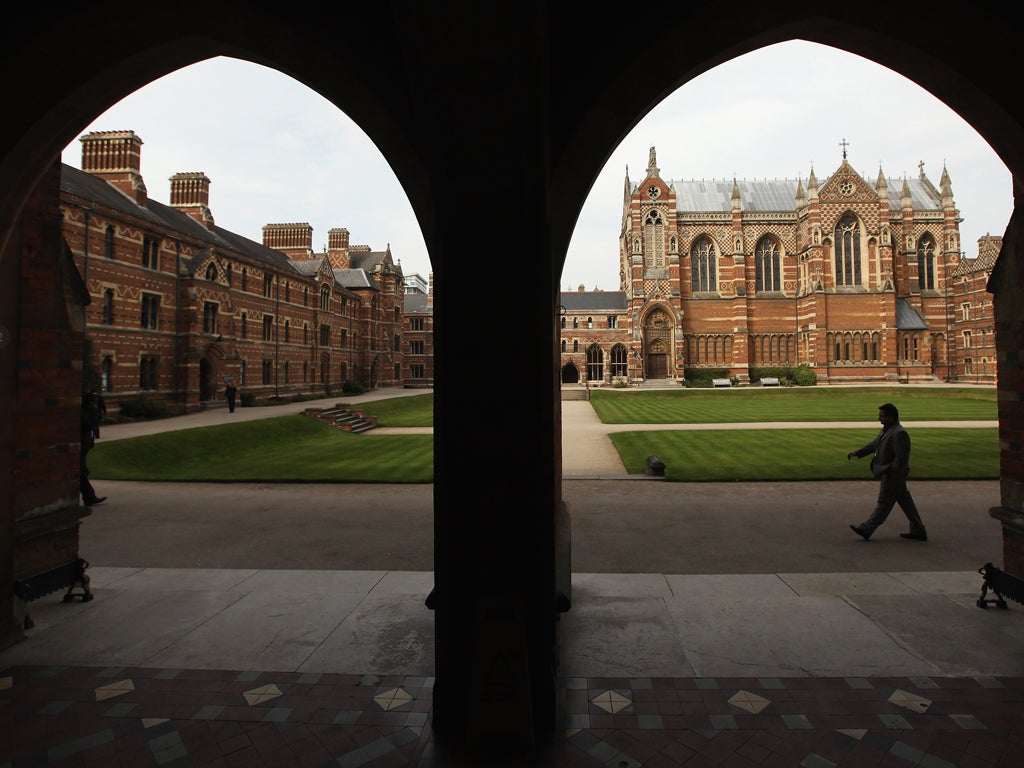Should the government give more help with postgraduate funding?
With all the furore surrounding undergraduate tuition fees, the crisis in postgraduate funding is going practically undetected - but it is a real and growing problem.

Your support helps us to tell the story
From reproductive rights to climate change to Big Tech, The Independent is on the ground when the story is developing. Whether it's investigating the financials of Elon Musk's pro-Trump PAC or producing our latest documentary, 'The A Word', which shines a light on the American women fighting for reproductive rights, we know how important it is to parse out the facts from the messaging.
At such a critical moment in US history, we need reporters on the ground. Your donation allows us to keep sending journalists to speak to both sides of the story.
The Independent is trusted by Americans across the entire political spectrum. And unlike many other quality news outlets, we choose not to lock Americans out of our reporting and analysis with paywalls. We believe quality journalism should be available to everyone, paid for by those who can afford it.
Your support makes all the difference.On 12 December 2012, the government’s higher education department published a policy stating that 'anyone with the ability who wants to go to university should have the chance to do so, whatever their economic or social background'. After the sharp increase in undergraduate fees this academic year, the government is striving to show that they support the efforts of those wishing to attend university who have the ability, but not necessarily the financial means.
This recent rise in undergraduate fees is thought to be responsible for the 8.7 per cent decrease in university applicants reported by UCAS this time last year, but 30 per cent of men and 40 per cent of women in each year group are still thought to be obtaining a degree. Even with this decrease in applications, UCAS figures show that over 50,000 more people were accepted to university in 2012 than just five years previous. With undergraduate admissions on the rise overall, it seems logical that more people would wish to go a step further than this to obtain a postgraduate degree.
However, the shock of increased undergraduate fees has overshadowed the problem of postgraduate funding. The UK currently offers very little in the way of student finance for postgraduate degrees. The closest alternative is a professional and career development loan, which allows you to borrow up to £10,000 for a postgraduate course at the discretion of your bank. Although the government pays the interest on this loan during your studies, after that the repayments and interest are your responsibility; there is little difference between this and an ordinary loan. This is considered to be the last resort in terms of finding funding for your degree, once you have already exhausted the options of scholarships and bursaries, part-time employment and donations from charities.
Although there appears to be a vast range of options available, it is clear that the majority of financial help is offered to research students working in a field of interest for the benefactor. Durham PhD student Michael Foulkes points out that 'it's understandable that when money's tight people are more likely to fund someone who will cure diseases or invent something, rather than someone who fancies looking at 17th century French theatre or Latin', but his 'concern with postgrad funding in general is that it seems to be heading away from learning for the sake of it'.
This does seem to be reflected on many of the postgraduate admissions sections of UK university websites. Despite 'recognis[ing] that funding your study can be a major barrier to realising your ambitions', Exeter University calls itself a ‘research-intensive university’, seemingly sidelining those who wish to take up a taught postgraduate degree. Oxford University also implies this, stating that 62 per cent of research students receive full scholarship funding, in comparison to just 17 per cent of students on taught Master’s courses.
In fact, if you are lucky enough to be accepted onto a postgraduate course at Oxford University, the establishment requires a college financial guarantee outlining how you intend to pay your course fees and their estimated minimum living costs, which stand at an eye-watering £12,900 for 12 months as a postgraduate in 2013/14. The guarantee may not include projected earnings from any employment, and relevant evidence must be shown from all sources that will be used to finance the degree; a daunting task for many, proving that a choosing to do a postgraduate degree is a lengthy and arduous process. Cambridge University 'strongly recommends that students begin researching their funding opportunities at least a year in advance of the proposed start date of their course', as deadlines for applications for funding can be a year prior to the beginning of their studies, showing that even the brightest can suffer for being unorganized.
Even if you are fortunate enough to receive partial funding for a postgraduate degree, for students already in significant debt from their undergraduate degree, this can seem barely a dent in the huge cost of continuing in higher education. Surely the government should do more for those students who have a genuine joy and talent for academia; an English Student may never cure the world from cancer, but may go on to produce literature to heal the hearts of a nation. It is wrong to allow financial difficulty to discourage learning at a high level, and more help should be given by the government to ensure that gifted minds reach their full potential so that they can best contribute to the UK’s rich culture.
Join our commenting forum
Join thought-provoking conversations, follow other Independent readers and see their replies
Comments